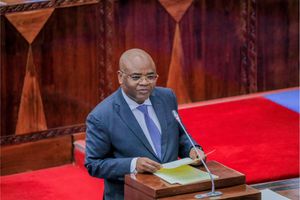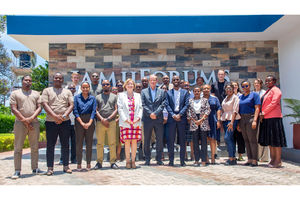Tanzania to build Sh3 billion avocado processing plants

Tanzania currently earns at least $12 million annually in avocado exports. PHOTO | COURTESY
What you need to know:
- It is estimated that some 39,000 tonnes of the fruit are produced locally, but only between 8,500 and 9,000 tonnes were exported last year
- With a lack of processing capacity, some of the fruits rot before they are consumed or exported
Iringa. President Samia Suluhu Hassan said yesterday that the government will spend Sh3 billion to build two avocado processing plants in a deliberate effort to cut post-harvest losses of the crop.
Tanzania currently earns at least $12 million annually in avocado exports.
It is estimated that some 39,000 tonnes of the fruit are produced locally, but only between 8,500 and 9,000 tonnes were exported last year. With a lack of processing capacity, some of the fruits rot before they are consumed or exported.
Against this background, Mufindi South Member of Parliament David Kihenzile pleased with the President’s pledge -- during a public rally here yesterday -- that the area needs a processing plant for avocados.
“Since we’re one of major producers of the crops, your administration shouldn’t alternate the planned facility to be built here,” he said.
In response, President Hassan said: “The government will not change its plan. We are going to build the facility here (Iringa), and as far as Njombe is concern, we will also see what we can do so that we create a conducive environment for investors as well as ensuring that raw materials are easily available.”
She therefore urged farmers to be registered so as to benefit from fertiliser subsidy saying: “This time it is different as you need to be registered and given a special code through which you will be able to buy fertilizer at a subsidised rate which is deducted by 5o percent.”
Adding that: “The government is keen in searching for a market, go and till the land with assurance of the market, the government is also investing heavily in irrigation, we want to change the sector from a rainfed one.”
According to the ministry of agriculture, the facility worth Sh3 billion, will have the capacity to processes at 3,600 tonnes of avocado annually, fetching at least Sh23 billion and while the factory will be built by the government, but will be operated by the private sector under the public-private partnerships (PPPs).
For his part, the minister responsible for agriculture, Mr Hussein Bashe said: “I urge my fellow farmers, do not harvest, and sell immature avocados, as you will ruin the market, which is the last thing we want.
Adding that: “I understand that you have been buying avocado seedlings at Sh6,000 per seedling, the government is working hard to reduce the amount so by the end of this year, you will be buying it at Sh2000.”
According to latest media data, avocado production has increased from 20,000 tons in 2015/2016 to 190,000 tons in 2018/2019, thus its exports of avocado increased from 3,279 tonnes in 2015 to 9,000 tonnes in 2019 worth $8.5 million.
It is said that Tanzanian avocados are sold in European markets including France, Spain, Germany, Switzerland, the Netherlands and the United Kingdom as well as in Japan and the United Arab Emirates. Avocado farming is said to gain momentum in 2015 and the regions which are major producers are Njombe, Iringa, Songwe, Morogoro, Kagera, Arusha, Kilimanjaro and Tanga.
Besides, in the Njombe Region, there is only one factory (ALVADO TZ Limited) with capacity to process and produce 100 tonnes of avocado oil annually, though currently the plant processes only 60 tonnes annually.
On the other hand, the minister assured the country’s farmers saying: “We have just started by subsidizing fertilizers, which is mostly imported, but by 2025, we will have enough from within the country, this is due to the fact that there is an expansion project for Minjingu Mine and Fertilizer Company and the Burundi based Intracom Fertilizer Limited.”
According to the minister, the former wants to increase production from the current 100,000 tonnes annually to 300,000 tonnes while the latter is constructing a plant in Dodoma that will have an annual capacity of 500,000 tonnes equal to 70 percent of the annual demand.
Moreover, media reports indicated that the Dangote Industries Limited has also shown an intention of installing a UREA fertiliser facility in Mtwara Region.





